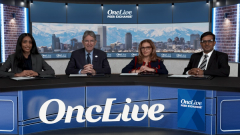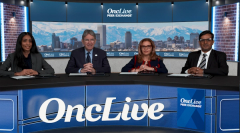
Hematologic Malignancies and Transplant Options and Conditioning Regimens Used in Allo-HSCT
Delve into the pre-transplant conditioning regimens such as chemotherapy and radiation used to prepare and immunosuppress patients to prevent graft rejection prior to allogeneic hematopoietic stem cell transplantation.
Episodes in this series

This is a video synopsis/summary of a Peer Exchange featuring Miguel-Angel Perales, MD; Nelli Bejanyan, MD; Amandeep Salhotra, MD; and Arpita Gandhi, MD, MS.
The panel discusses hematologic malignancies that commonly require allogeneic hematopoietic stem cell transplantation (allo-HSCT), including myelodysplastic syndrome (MDS), acute myeloid leukemia (AML), and acute lymphoblastic leukemia. Risk stratification tools help identify patients who meet the criteria for transplantation.
The choice and intensity of the conditioning regimen significantly impact outcomes. Myeloablative conditioning provides better relapse control and overall survival in fit AML and MDS patients aged 18 to 65 years, with fludarabine plus busulfan or melphalan being the most common regimens. Reduced-intensity regimens vary in intensity, and are suitable for elderly or unfit patients.
Despite a Blood & Marrow Transplant Clinical Trials Network study showing reduced chronic graft-vs-host disease and improved quality of life with bone marrow compared to peripheral blood stem cells, this finding has not significantly impacted clinical practice. The panel emphasizes that myeloablative conditioning should be the standard of care for younger, fit patients with high-risk diseases based on available phase 3 data, as patients typically have only 1 chance to undergo transplantation.
Video synopsis is AI-generated and reviewed by OncLive® editorial staff.






































